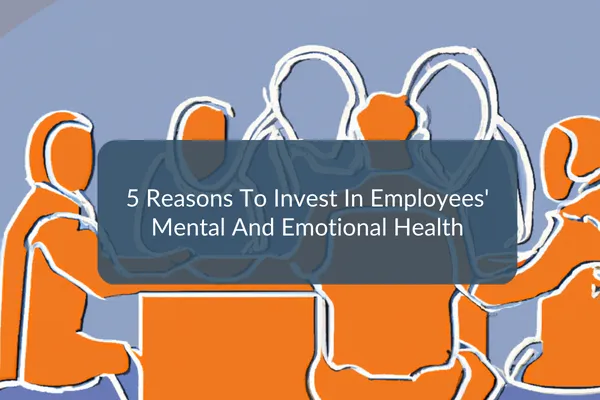
Five reasons your business must invest in employee mental and emotional health.
The number one asset in any business to gain success and scale quickly is the people that you employ.
Employees are your greatest resource as a business owner. Yet, employee stress is the highest it has ever been. Which begs the question, why are businesses still so reluctant to prioritise mental health and emotionall wellbeing?
A study produced in 2020 showed, that in the UK 79% of British adults were experiencing stress that was directly related to their work. This was, shockingly, outside of any additional financial, family and health stress.
But what is the result of having stressed out employees in your business?
Having employees that are struggling with burnout leads to poor productivity levels and a high potential of you losing your best talent.
And with the additional hiring, recruiting and training costs that come with employees that quit, this could be detrimental to the growth of your business.
Here’s how to prevent that from happening and retain employees.
The Cost of Poor Mental Health
To be honest, no matter how much the narrative around mental health changes online, most workplaces still struggle to prioritise creating a comfortable environment where these ‘taboo’ topics can be openly spoken about.
But the science shouldn’t be overlooked.
There is a direct correlation between the mental and emotional health of people within your business and the health of your business.
And if you’re not convinced yet, just take a look at the financial impact that poor mental health could be costing you. A study produced by Deloitte estimated mental health conditions within UK employees had cost businesses, 42bn to 45bn each year.
This is an accumulation of the sick days that had to be taken for mental health issues.
This is a dramatic increase of about 6bn since the last report on this topic in 2017, making this issue more present than ever and only getting worse.
Another survey that was conducted by Vitality, estimated that the average day lost per employee rose up to 23 days.
The Cost of Poor Mental Health on Your Business
But it is easy to dramatise these numbers, and not think about the effect that it is having on YOUR own business.
Deloitte found that poor mental health costs, an average of 5.8% of employees annual earnings.
To put that into perspective, ask yourself this question, “What is 5.8% of your annual salary?” This is what you risk losing per employee each year.
The financial aspect isn’t the only thing that should motivate you to invest into employee well-being though, there are many other factors to consider.
The Effect on Employee Performance
The more satisfied employees are with their jobs = The more likely they are to be consistently productive and produce work of a high quality.
There is often this notion that well-being and work cannot coincide with each other. That wellbeing is something that should be left outside of the workplace but this belief is outdated and limits your business’ potential.
Employees that experience burn out at high-level have reported that their job and the stress that comes with it makes it challenging to fulfil responsibilities whilst they are at home and this then impacts how they act at work.
If your employees are struggling to be present at work not only can they not focus on the task, but the performance levels will be far lower than their capability.
Cognitive performance and clarity are directly impacted by emotional well-being.
Long periods of stress triggers the fight, flight or freeze response in the brain and the deep analytical thinking part of the brain is switched off. The employee goes into survival mode.
This results in an inability to…
Retain information
Prioritise task load
Concentrate
Problem solve and prevent mistakes
Therefore, it is simply a no brainer that in order to retain and improve performance within your business, your employees must feel good within themselves first.
Resources available
From meditative sessions to stress management regulation programs, there are countless options for you to choose from.
When you invest in employee mental and emotional health that also leads to an improvement in creativity. And having employees with a creative problem-solving attitude can help develop your business in many ways.
When we, as business owners, help to equip employees with tools to be able to handle stressful situations in the workplace and at home, the productivity level increases by 2.5x but not only that, they will leave feeling more satisfied with their job which subsequently increases morale throughout your organisation.

Retaining Staff
An organisation which does not have a high level of employee retention will find it challenging to compete against others companies and attract quality candidates.
As previously written in my article “5 ways to promote workplace, mental and emotional well-being” making a simple small investment into employee mental health can reduce employee turnover. The first step to do this is by creating an environment where your employees feel valued and have an outlet where they can find support.
If your employees feel connected to the organisation they are less likely to look for jobs elsewhere. Deloitte estimated online that £9 billion a year is spent on staff turnover that has resulted from poor mental health. This is from the excessive price that it costs your business to attract, recruit and train new employees.
This exact same report also displayed that businesses who are invested in emotional and mental well-being saw a reduction in staff turnover by around 14%.
Another study that was produced by the American psychological Association revealed that employee health programs can reduce turnover by up to 25% compared to businesses that do not offer any support at all.
A study from Indeed in the United States said that the likelihood of a jobseeker applying for a position increased by up to 14% if the workplace establishment had an average rather than low work happiness score.
It is also no secret that the younger generation favours ‘happier’ workplaces, and are the first generation to really refuse to stay in jobs that make them unhappy.
Better Health and Reduced Safety Risks
With all that being said, it is evident that you cannot always separate mental and physical health.
This is easily examined when we look at the biggest killer in the western world, which is heart disease. The number one cause of heart disease is stress.
Humans are not equipped to be living in the stress response.
This system was designed for short-term responses to help you remain safe. But with so many people living a high stress life, there has now been a dramatic increase in inflammatory and autoimmune diseases, costing the US economy a shocking 80 billion in lost earnings, medical costs and disability benefits.
These statistics only seem to continue with, The world health organisation stating that depression would be the next cause of death and the most common disability that we see worldwide from ages 15 to 44 years old.
But, if the mental well-being has not encouraged you to be proactive in your employees emotional health yet, then the support that can be offered in the workplace for emotional health also has a significantly positive impact on reducing safety incidents at work due to people being more focused on the task at hand and this has the potential to save your business thousands in insurance premiums.
In summary...
Your employees are your greatest asset. The more that you focus on their physical and mental health, the more improvement you will see amongst the success of your organisation
And if I’ve not completely convinced you yet, I will leave you with final case today from Deloitte who said that for every £1 a business invests in mental health initiatives, they will gain an average of £5 in return.
➡️ Are you looking for support for your team? Get in touch!
I offer a range of mental and emotional well-being services, including face-to-face and online talks and workshops, and specialised programmes to overcome anxiety and stress, and develop mental and emotional resilience with a science backed approach.

Copyright ©2023 Resilience for Modern Life - Clan Wellness Ltd - All rights reserved
Tel: 01389 504 550
E: contact@clanwellness.com

